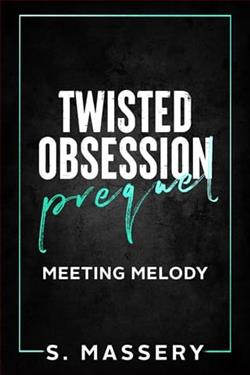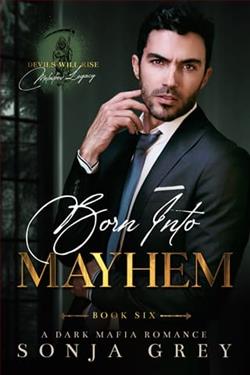Page 76 of Befriending the Bear
It wasn’t magic. Not the cinematic kind. No swelling violin or fireworks. It was two men who had lived full, hard, quiet lives. Who had both loved and lost. Who had both spent years thinking they’d missed their window. It was a second chance we never saw coming. A last verse added to a song we thought had already ended.
When we got back to the cottage, Fraser stopped me shy of the front porch. He turned to me. “Close your eyes.”
I did without hesitation.
“Please imagine me carrying you across the threshold.”
I smiled. God, I loved that man. “Should I p-pretend you’re not using your c-cane too?”
Fraser’s warm, low chuckle filled the quiet space between us. “Sweetheart, if I had a third arm, I’d be sweeping you off your feet like a goddamn romance novel hero.”
“Well, as long as we’re p-playing pretend, can you be w-w-wearing a tuxedo and a f-firefighter’s helmet?”
“Oh, I see,” he said, stepping closer. “Now it’s a fantasy.”
“You st-started it.”
His lips brushed my cheek. “All right. Open your eyes.”
I did—and immediately forgot every word in the English language.
A string of warm white lights curved along the porch beams, casting a soft glow over the wood. A bouquet of blue hyacinths and yellow daffodils stood beside the door, nestled in one of my grandmother’s old ceramic pitchers. And hanging just beneath the porch light, swaying a little in the breeze, was a small wooden sign.
“Calloway and Fraser Gilstrap,” it read.
He’d taken my name. Even Marcus had never done that, and I hadn’t taken his name either when we married. With Fraser, I’d never asked, but he’d offered, somehow knowing I needed to publish under my own name. He wasn’t attached to his, he’d said, and so he’d taken mine. This man would always put me first, and that took my breath away.
I said nothing for a moment. Couldn’t. The wind wasn’t strong, but my eyes stung anyway.
Fraser stepped up beside me, his voice quieter now. “I asked Macallister to help. He carved the plank. I just…” He gestured vaguely. “I wanted something waiting when we came home.”
Our home.
I turned to him, throat thick. “How d-do you always know what I n-need before I do?”
He looked sheepish. “I listen.”
“I love you,” I said because I needed to say it again, needed him to hear it again.
“I love you too. More than I thought I ever would again.”
The front door creaked as we stepped inside, and it felt exactly like it always had, except everything had changed. Fraser toed off his boots while I hung my jacket on the peg, and in the stillness that followed, I felt the quiet rearrange itself. This was no longer my house. It hadn’t been for months, really. Now it was ours.
He hung up his coat beside mine, the sleeves brushing like they’d been waiting to meet. I watched him move through the space with the ease of someone who belonged there—topping off the kettle with practiced hands, adjusting the throw blanket on the couch, pulling two mugs down from the shelf with the absent grace of muscle memory. It still undid me sometimes. How gently he fit into my life without trying to reshape it.
When he turned and caught me watching him, he didn’t flinch or ask. He opened his arms, and I stepped into them. We stood like that for a long time in the red-gold light of the living room lamp, hearts aligned in a rhythm only we could hear.
“Are you tired?” he asked, whispering into my hair.
“No,” I said. “N-not even close.”
“Good.” He pulled back to kiss me. “Because I have plans.”
“For the honeymoon I t-told you we’re not t-taking?” I teased.
He kissed the corner of my mouth. “We’re already on it.”
I snorted. “You can’t d-declare that everyday life is our honeymoon. That’s n-not how it works.”















